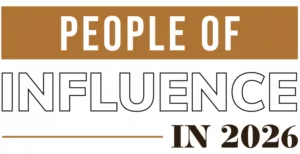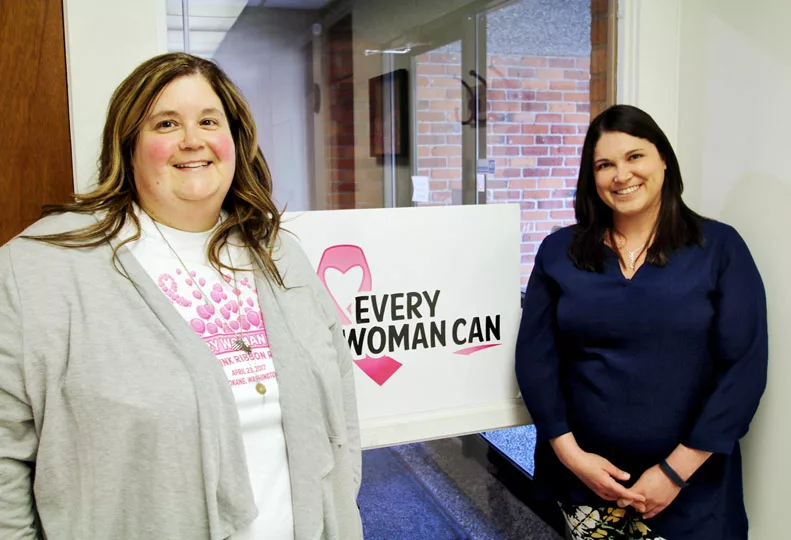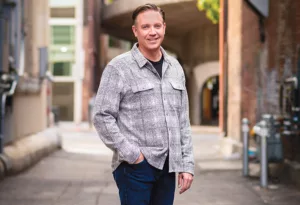
Home » New breast cancer nonprofit emerges in Spokane
New breast cancer nonprofit emerges in Spokane
Advocates here opt to end affiliation as Susan G. Komen chapter

June 8, 2017
Deb Barnes, president and CEO of Every Woman Can, says the newly created nonprofit dedicated to breast cancer awareness soon will start seeking to move the topic of the disease more pointedly into the discussion of health care in general.
The new nonprofit, located at 915 W. Second in downtown Spokane, was created to replace the former Susan G. Komen of Eastern Washington chapter at the end of March.
“The issue of health care is challenging right now. What we do seem to know now is that whatever happens with health care, it’s going to look different,” Barnes says.
She adds, “Now there’s a real opportunity for us to move the issue of this disease and make it more central to the health care discussion.”
As an example, cancer screenings for mammograms currently are covered by most insurance providers. However, if changes to the health care system potentially jeopardize coverage, Barnes says breast cancer awareness organizations must be proactive against any such changes.
Barnes believes more attention can be generated for a disease that one out of every eight women will experience.
“It’s an opportunity to enhance the narrative around breast health,” she says. “Breast cancer is not preventable, but there are things we can do to be healthier.”
She adds, “Treatment for breast cancer is not for sissies. It’s a difficult, arduous road for some women, and the healthier you are to meet that challenge, the better off the results are. We really see health and wellness as a new component to our organization.”
Every Woman Can now is charged with filling a vacuum that was created when Susan G. Komen’s board of directors here decided in February to end its contract with the Dallas-based parent organization at the end of March. The decision was based mostly on disagreement about where the monies raised here were being used.
“It’s super easy for people to think of us as Komen light, or Komen 2, but we’re really not that. We really are a new entity,” Barnes says.
The decision to end the relationship with Susan G. Komen occurred just 2 1/2 months before the Komen Eastern Washington chapter’ annual Race for the Cure in April, which had grown into a large fundraising effort here. Money raised through the event is dedicated to breast cancer research and education programs, Barnes says.
Every Woman Can managed to organize its inaugural Pink Ribbon Run, also in April, drawing more than 2,000 participants. Combined with a fundraiser with the Spokane Chiefs hockey organization, Every Woman Can has raised $30,000 since starting operations, she says.
“Would we be able to, in 10 weeks, close an affiliate, start a new organization, find a name for our new organization, and produce that run? Yes, we did,” she says.
“Did we think we could at the time? We had hopes, but it was a lot of work,” she adds with a laugh.
Barnes says the nonprofit got its name after reaching out to Inland Imaging PS, the big Spokane-based radiology services provider, which had operated its own organization with the name Every Woman Can that also was dedicated to breast cancer awareness.
“We didn’t know exactly what was happening with that organization, so we reached out to them and asked, ‘What would you think about giving us that name?’ It was a pretty big ask, but without any hesitation they said yes,” Barnes says.
Working in a 1,200-square-foot office suite, Every Woman Can has two paid full-time employees. Tara McAloon serves as the director of community outreach, and Tiffany Franklin is an administrative coordinator.
Debbie Jennison works as part-time grants administrator, Ann Bergeman serves as board treasurer, and Barnes, for now, is exclusively a volunteer, she says.
Salaries and other administrative costs are funded solely through private donations and assistance from Inland Imaging, a founding partner for Every Woman Can, Barnes says.
She had been hired by the Susan G. Komen board about three years ago to be a consultant to its chapter here. The board eventually selected her to be its executive director in what proved to be the nonprofit’s final three-year contract with the national organization, she says.
Barnes says she’s “completely invested” in Every Woman Can, and though she’s a volunteer now, says she contributes well over 40 hours per week to help the nonprofit get off to a strong start.
A significant reason for shuttering the Susan G. Komen chapter, which had operated for 14 years here, was because 25 percent of the money raised here was sent to Dallas to support breast cancer research.
“We live in a very different time now than we used to. Donors once said of breast cancer, ‘Here’s my dollar.’ Now, it’s, ‘Where’s my dollar going?’’’ Barnes says.
Every Woman Can is striving to ensure that every dollar raised in Eastern Washington stays here for research, support, and education programs, Barnes says.
Also, Susan G. Komen of Eastern Washington served 14 Eastern Washington counties, but Every Woman Can is striving to have an outreach in all 20 Washington state counties east of the Cascades, Barnes says.
Susan G. Komen’s board of directors here also decided against merging with other Susan G. Komen affiliates around the Pacific Northwest, she says.
“The board’s decision came down to, ‘What does our community need, and how do we best serve it?’’’ says Barnes.
Every Woman Can aspires to place at least one member from each county on its board.
“We want to make sure we’re understanding the changing needs of their communities because no one community is the same,” Barnes says.
Adds McAloon, “That’s one of the biggest differences between this organization and Komen; the ability to go out into Wenatchee, Ellensburg, and Yakima.”
Susan G. Komen Eastern Washington could provide education and outreach in those communities; however, they couldn’t apply for grant assistance from the Komen nonprofit, McAloon says.
As a result, Every Woman Can so far has received $500,000 in grant application requests from breast cancer awareness groups across the 20 counties it now seeks to serve. A review board so far has approved funding for $210,000 in application requests.
“That’s pretty generous given the fact we haven’t fundraised that yet,” Barnes says with a laugh. “We’re going to do our very best to fulfill that.”
She says the organization still doesn’t have a projected annual budget and remains uncertain about how much it can provide in grant funding in coming years.
Requests for financial assistance are from organizations that provide services ranging from breast health education and mammogram services to transportation and nutrition support for breast cancer patients.
“We know there’s a significant need for help in these communities. The underserved communities may not have the kind of infrastructure and support as others,” Barnes says.
Despite what Every Woman Can seeks to offer, Barnes said it was a hard decision for the board to end ties with the Susan G. Komen organization.
“There are thousands and thousands of women who’ve been helped, who’ve had families involved with this cause, and community leaders and volunteers who gave countless hours to the organization. We know we have some big shoes to fill,” she says.
Latest News Up Close Health Care
Related Articles
Related Products


_web.webp?t=1764835652)
